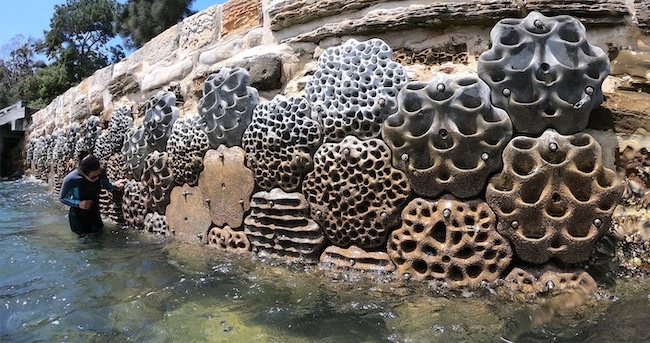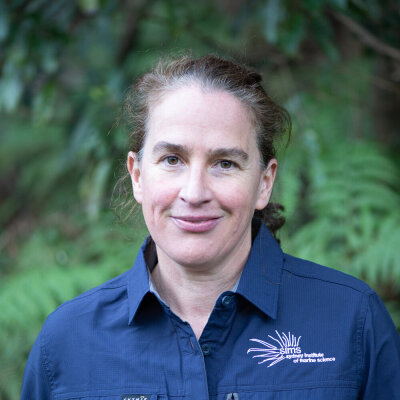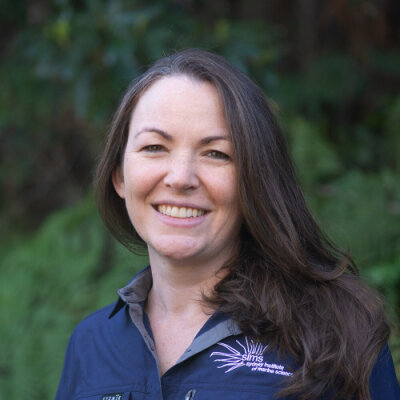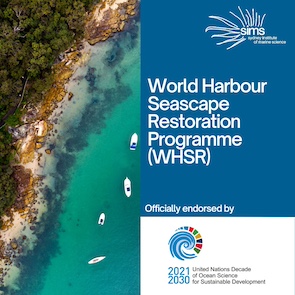 The United Nations has announced its endorsement of the World Harbour Seascape Restoration Programme (WHRP), a project led by the Sydney Institute of Marine Science.
The United Nations has announced its endorsement of the World Harbour Seascape Restoration Programme (WHRP), a project led by the Sydney Institute of Marine Science.
The Sydney Institute of Marine Science (SIMS) is a partnership between Macquarie University, UNSW, University of Sydney, UTS and several government organisations.
“This endorsement cements Macquarie's reputation as a leader in marine sustainability and follows our 2023 Times Higher Education ranking as the world’s leading institution in ‘Life Below Water’, which is the United Nations’ Sustainable Development Goal 14,” says Professor Lucy Marshall, Executive Dean of the Faculty of Science and Engineering.
“I’m very proud of the remarkable, long-term work our scientists have put in to achieve this endorsement, and of the global impact of their research, including Project Restore and Living Seawalls.”
The program sits within the United Nations Decade of Ocean Science for Sustainable Development 2021-2030, which brings together solutions that will help foster a healthier ocean.

“SIMS launched the World Harbour Project in 2014 to bring together international research institutions and agencies concerned with the health of heavily urbanised waterways and the increasing challenges they face,” says Professor Bishop.
The first phase of the World Harbour Project had four research themes: water and sediment quality, green engineering, multiple uses and users, and education.
“This second phase of the World Harbour Project combines these themes to address restoration of harbour seascapes at an unprecedented scale,” Professor Bishop says.
The World Harbour Seascapes Programme builds on SIMS-led research into multi-habitat seascape revival under the $4.5-million Project Restore.
“Project Restore is an ambitious project revitalising the Sydney Harbour seascape through the coordinated restoration of kelp and seagrass, and the implementation of artificial habitats, including Living Seawalls and fish pods,” says Professor Bishop.
“Previously, marine restoration typically would rehabilitate a single habitat type, but many marine species depend on multiple habitats to complete their life history. Our coordinated approach repairs multiple connected habitat patches in the seascape.”
Project Restore provides a world-leading template for harbour seascape restoration and a way to monitor and evaluate the success of these repair efforts.
“SIMS will use its global network of harbour cities, established through the World Harbour Project, to generate momentum for harbour restoration projects elsewhere,” says Professor Bishop.
As two of the Chief Investigators for Project Restore, Professor Bishop and Associate Professor Katherine Dafforn will lead the development of both the template for harbour seascape restoration and the toolkit to monitor and evaluate its success.
“We will share our learnings through the global network of harbour cities, established through the World Harbour Program, motivating and inspiring similar harbour restoration projects elsewhere,” Professor Bishop says.
Project Restore will also boost marine science education and research at Macquarie.
“Project Restore is an all-hands-on-deck project and higher degree research projects and research training are an important element of the program,” Professor Bishop says.
“Through Macquarie’s cotutelle and joint PhD programs, students that have cut their teeth in Sydney Harbour will have the opportunity to translate some of their learnings to other harbour cities.”
Associate Professor Dafforn from the School of Natural Sciences is an environmental scientist focused on managing urban impacts in marine systems.
“It is exciting news to have the program recognised by the UN and be able to scale up restoration for healthier harbours,” she says.
CEO of SIMS, Professor Martina Doblin from UTS, says the UN endorsement will connect a global network of researchers working to restore habitats in the urban ocean.
“It’s an opportunity for us to share our expertise, assist restoration efforts elsewhere and develop international guidelines for coastal developments that build for nature and people,” she says.

Φ